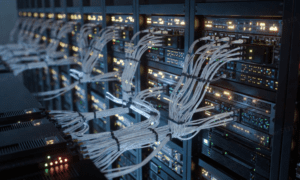Welcome to the digital age, where technology is revolutionizing every industry, including hospitality. In a world driven by convenience and efficiency, it’s no surprise that technology has become an indispensable tool for managing finances in the hospitality sector. From streamlining transactions to optimizing revenue management, embracing cutting-edge solutions can be a game-changer for hotels and other establishments. Join us as we delve into the importance of technology for hospitality financial management and discover how it can pave the way for success in this ever-evolving industry.
Introduction
Technology has played a crucial role in transforming various industries, including the hospitality sector. In today’s digital era, technology is not just a mere tool for communication or entertainment but also a means of driving efficiency and profitability for businesses. The hospitality industry, in particular, has benefitted greatly from the advancements in technology.
In this blog article, we will discuss the importance of technology for financial management in the hospitality industry. We will explore how technology has revolutionized financial processes and helped hotels and other establishments to stay competitive in a fast-paced environment.
The Evolving Role of Technology in Hospitality Financial Management
The hospitality industry has always been at the forefront of technological advancements, constantly seeking out new ways to improve customer service, streamline operations, and increase efficiency. However, technology’s role in the financial management aspect of hospitality has evolved significantly over the years. From manual spreadsheets to cloud-based solutions, technology has revolutionized how businesses in this industry manage their finances.
One of the most significant changes brought about by technology is the ability to collect and analyze vast amounts of data in real-time. Gone are the days where financial information had to be manually recorded and entered into spreadsheets, often leading to errors and delayed reporting. With advanced accounting software and cloud-based systems specifically designed for the hospitality sector, financial data can now be automatically captured, organized, and updated in real-time.
This not only saves time but also allows for more accurate and timely decision-making based on up-to-date financial information. For example, using forecasting tools integrated with financial software enables businesses to make informed decisions about pricing strategies or inventory management.
Moreover, technology has made it possible for businesses to track spending more efficiently through electronic invoicing and payment systems. This streamlines the accounts payable process by eliminating manual tasks such as printing checks and mailing invoices. It also reduces paper waste and lowers transaction costs.
In addition to data collection and tracking spending, modern technology plays a crucial role in enhancing risk management within hospitality finance departments. With fraud prevention tools like AI-powered fraud detection algorithms or machine learning techniques that can quickly identify suspicious patterns or transactions in real-time , businesses can safeguard their financial assets more effectively.
Another significant shift in how technology is used in hospitality financial management is the increasing use of cloud-based solutions. These systems offer many benefits, such as accessibility from anywhere with an internet connection, enhanced collaboration among team members, and automatic updates to ensure compliance with changing regulations.
Cloud-based systems also provide the flexibility to scale up or down depending on business needs, making them ideal for an industry like hospitality that experiences seasonal fluctuations in demand. With a cloud-based system, businesses can quickly add or remove users and adjust storage space without the need for significant upfront investment.
Benefits of Using Technology in Hospitality Financial Management
In today’s fast-paced business landscape, technology has become an integral part of every industry, including the hospitality sector. From automating processes to facilitating data analysis, the use of technology has revolutionized how businesses operate and manage their finances. In this section, we will delve into the various benefits of using technology in hospitality financial management.
1. Increased Efficiency and Accuracy:
One of the biggest advantages of incorporating technology in hospitality financial management is its ability to improve efficiency and accuracy. With manual bookkeeping and accounting systems being prone to human error and time-consuming, digitizing these processes can significantly speed up tasks such as invoicing, reconciling accounts, and tracking expenses. This not only saves time but also reduces errors that could potentially impact the financial health of a business.
2. Streamlined Financial Reporting:
Thanks to technological advancements, traditional paper-based reporting methods have been replaced with digital dashboards and analytics tools that provide real-time insights into a business’s financial performance. This allows for more accurate forecasting and better decision-making based on data-driven insights rather than intuition or guesswork.
3. Cost Savings:
Technology can help reduce costs associated with managing finances in the hospitality industry by automating manual processes like inventory control, procurement, payroll processing, etc., which require extensive manpower. This not only cuts down on labor costs but also reduces the chances of human error that might result in additional expenses.
4. Enhanced Data Security:
The confidentiality of financial data is crucial in any industry but especially so in hospitality where customers’ sensitive information is often stored. Technology can help mitigate the risks of data breaches and fraud by implementing secure systems and encryption tools to protect financial data.
5. Facilitates Integration:
Many businesses in the hospitality industry use different software systems for different functions, such as accounting, inventory management, and payroll processing. With the integration capabilities of technology, these systems can now be synced together to provide a seamless flow of information. This not only saves time but also eliminates redundancies and ensures accuracy in financial reporting.
6. Better Customer Experience:
With the rise of online bookings and digital payments, technology has made it easier for customers to book rooms or services, make payments securely and efficiently. From online check-ins to self-service kiosks, technology has transformed the customer experience in the hospitality industry.
7. Competitive Advantage:
In today’s competitive landscape, businesses that embrace technology have a significant advantage over those that don’t. Customers expect efficient service delivery and seamless experiences from businesses they engage with, which is now possible thanks to technology’s innovative solutions in hospitality financial management.
Examples of Technological Solutions for Hospitality Financial Management
Technology has revolutionized every aspect of the hospitality industry, including financial management. With the use of advanced technology, hotels and other hospitality businesses can now manage their finances more efficiently, accurately, and securely than ever before. In this section, we will explore some examples of technological solutions that are being used in the hospitality industry to streamline financial management processes.
1. Cloud-based Accounting Software:
One of the most commonly used technological solutions for hospitality financial management is cloud-based accounting software. This software allows businesses to track their expenses and revenue in real-time from any location with an internet connection. It also provides a centralized platform for managing all financial transactions such as payments, invoices, and budgeting.
The use of cloud-based accounting software eliminates the need for manual data entry and reduces human errors, thus ensuring accuracy in financial records. It also facilitates collaboration between different departments within a hotel or hospitality business by allowing them to access the same information simultaneously.
2. Point-of-Sale (POS) Systems:
POS systems have become an essential tool for managing finances in various industries, including hospitality. These systems enable seamless integration between front-end operations like customer check-ins and back-end operations like inventory management and sales analysis.
With POS systems, hotels can process payments quickly and accurately, reducing long queues at check-out counters. They also provide detailed reports on daily sales activities that help businesses make informed decisions about pricing strategies, inventory management, and revenue forecasting.
3. Mobile Payment Solutions:
In today’s digital age where people prefer cashless transactions, mobile payment solutions have become a popular choice in the hospitality industry. These solutions allow customers to make payments using their smartphones, eliminating the need for physical credit cards or cash.
Mobile payment systems are secure, convenient, and fast, making them an attractive option for both businesses and customers. They streamline the payment process and reduce the risk of errors during transactions.
4. Expense Management Tools:
Hospitality businesses often incur various expenses on a daily basis, such as travel expenses, food costs, and supplies. Keeping track of these expenses can be challenging without proper tools. This is where expense management tools come into play.
These tools help businesses track and manage their expenses in real-time by capturing receipts and categorizing expenses automatically. This not only saves time but also minimizes the chances of errors in financial records.
5. Revenue Management Software:
For hospitality businesses to thrive, effective revenue management is crucial. Revenue management software uses sophisticated algorithms to analyze market demand data and set optimal prices for hotel rooms and other services.
These systems also provide insights into competitors’ pricing strategies and historical data to help businesses make informed decisions about room rates. By optimizing pricing strategies, hotels can increase revenue without sacrificing occupancy rates.
Challenges and Solutions for Implementing Technology in the Industry
Implementing technology in the hospitality industry brings a multitude of benefits, ranging from increased efficiency to enhanced guest experiences. However, like any new initiative, there are bound to be challenges that arise during implementation. In this section, we will explore some common challenges faced by hospitality businesses when integrating technology into their financial management systems and discuss potential solutions.
1. Resistance to Change: One of the biggest hurdles in implementing technology is resistance to change from employees. Many may feel overwhelmed or intimidated by new systems and processes, leading to a lack of buy-in or adoption. This can result in delayed training, reduced productivity, and extended timelines for implementing technology.
Solution: To address this challenge, it is crucial to involve employees in the decision-making process early on and communicate the benefits of the new system to them clearly. Offering comprehensive training programs and creating a user-friendly interface can also help ease their transition into using technology.
2. Cost: Another significant challenge is the cost associated with implementing technology. From purchasing software licenses to hardware upgrades and ongoing maintenance costs – investing in technology can be expensive, especially for small businesses with limited budgets.
Solution: To mitigate this challenge, businesses should carefully assess their specific needs before selecting a solution that best fits their budget. They can also consider leasing equipment rather than buying outright or opt for cloud-based software that offers flexible payment options.
3. Integration Issues: The hospitality industry relies on multiple software applications for its operations – such as property management systems, point of sale systems, and accounting software. Integrating all these distinct systems can be complex and time-consuming.
Solution: To overcome this challenge, businesses can opt for an integrated technology solution that consolidates multiple functionalities into a single platform. Alternatively, they can consult with a technology provider to customize and integrate their existing systems seamlessly.
4. Cybersecurity Risks: With the increasing use of technology, hoteliers face greater cybersecurity risks than ever before. In the event of a data breach or cyber attack, not only is sensitive guest information at risk, but it can also lead to severe financial losses and damage to the business’s reputation.
Solution: To address this challenge, businesses must implement robust cybersecurity measures such as data encryption, firewalls, malware protection, and regular backups. They should also conduct regular employee training on best practices for securing sensitive information.
5. Maintenance and Upkeep: Technology is constantly evolving, which means regular maintenance and upgrades are necessary to keep systems running smoothly. This can be time-consuming and require significant resources.
Solution: Working with a trusted technology provider who offers ongoing support and maintenance services can help mitigate this challenge. Additionally, opting for cloud-based solutions reduces the burden of maintaining hardware infrastructure on-site.
Future Trends of Technology in Hospitality Financial Management
The world of hospitality financial management is constantly evolving, and one of the major driving forces behind this evolution is technology. As new technologies emerge and existing ones are improved upon, the landscape of hospitality finance is transformed.
In this section, we will explore some of the future trends that are expected to have a significant impact on financial management in the hospitality industry.
1. Artificial Intelligence (AI) and Machine Learning
Artificial Intelligence and machine learning technologies have revolutionized many industries, and it’s no different for hospitality financial management. AI-powered systems can analyze large amounts of data in real-time, providing valuable insights into customer behavior, market trends, and financial performance.
In the future, we can expect to see even more sophisticated AI algorithms being developed specifically for financial analysis and forecasting in the hospitality sector. These intelligent systems will enable hotel managers to make more informed decisions about pricing strategies, revenue management, and cost optimization.
2. Cloud Computing
Cloud computing has already made a tremendous impact on various aspects of business operations across industries. In the realm of finance, cloud-based accounting software has simplified bookkeeping processes for many businesses.
For the hospitality industry specifically, cloud-based systems offer several benefits such as remote access to financial data from any location or device and automatic updates without any manual installations. This not only improves efficiency but also reduces costs associated with hardware and maintenance.
3. Mobile Payment Technology
Mobile payment technology has been gaining traction worldwide in recent years due to its convenience and security features. The rise of contactless payments, especially in the wake of the COVID-19 pandemic, has accelerated the adoption of mobile payment solutions.
For the hospitality industry, this means that guests will expect to be able to pay for their hotel stays and services using their smartphone. As a result, hotels will need to invest in secure and user-friendly mobile payment systems to stay competitive.
4. Blockchain
Blockchain technology is best known for its role in digital currencies like Bitcoin. However, it has potential applications beyond just cryptocurrency. In the hospitality industry, blockchain can be used for secure and transparent transactions between hotels and their customers.
In addition to providing a more efficient payment process, blockchain can also help with supply chain management by tracking inventory and reducing fraud.
5. Big Data Analytics
Big data analytics refers to the use of advanced analytical tools to process large datasets and identify patterns or trends that are not immediately apparent. In hospitality financial management, big data analytics can help hotels gain valuable insights into customer preferences and behavior.
By analyzing this data, hotels can make more personalized marketing strategies and improve their revenue management techniques.
Conclusion
In this digital age, the use and implementation of technology have become more prevalent than ever. Hospitality financial management is no exception to this trend, as it plays a crucial role in streamlining processes and improving efficiency within the industry. From automated accounting systems to advanced data analytics, technology has transformed the way financial information is managed and analyzed in the hospitality sector. It is evident that embracing technological innovations is necessary for businesses to remain competitive and successful in today’s fast-paced world. By incorporating new technologies into their financial management practices, hospitality companies can enhance their decision-making abilities, reduce costs, improve customer experiences, and ultimately drive growth and success.



































